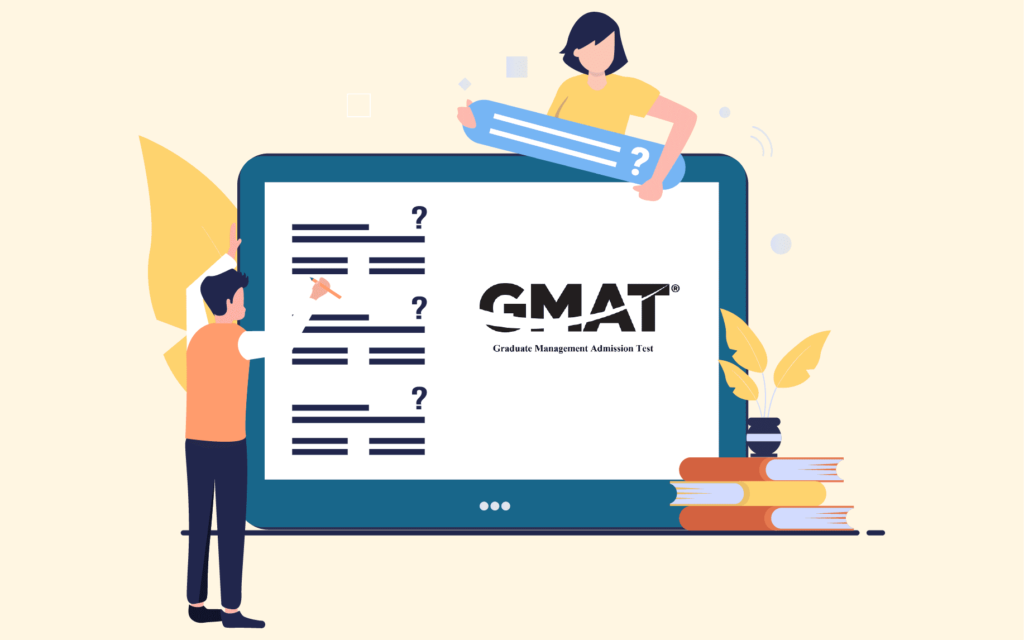Table of Contents
Here are some 3 Easy Tips to Ace the GMAT 2024 Exam
The Graduate Management Admission Test (GMAT) stands as a crucial benchmark for prospective MBA students. It is a computer-adaptive test designed to assess analytical writing, quantitative, verbal, and reading skills in written English. The outcome of this test is a significant factor in MBA admissions, influencing the opportunities available at top business schools globally.
Effective preparation is key to excelling in the GMAT. Understanding the structure, mastering the content, and adopting the right strategies can significantly influence one’s score. This blog aims to simplify the preparation process by providing three straightforward tips that can help candidates excel in the 2024 GMAT exam.
Understand the GMAT Structure and Format
The GMAT exam consists of four main sections, each designed to test different skills that are crucial for success in graduate management programs. Understanding each section’s format and what it demands is the first step toward effective preparation.
1. Analytical Writing Assessment (AWA)
- Objective: This section tests your ability to think critically and to communicate your ideas.
- Format: You will analyze an argument and write a critique of that argument.
- Duration: 30 minutes for one essay.
2. Integrated Reasoning (IR)
- Objective: This section measures your ability to evaluate information presented in multiple formats from multiple sources.
- Format: Includes 12 questions involving multi-source reasoning, graphics interpretation, two-part analysis, and table analysis.
- Duration: 30 minutes.
3. Quantitative Section
- Objective: This section tests your mathematical skills and your ability to analyze data and draw conclusions using reasoning skills.
- Format: Consists of 31 questions, including problem-solving and data sufficiency.
- Duration: 62 minutes.
4. Verbal Section
- Objective: This section measures your ability to read and understand written material, to evaluate arguments, and to correct written material to conform to standard written English.
- Format: Includes 36 questions, involving reading comprehension, critical reasoning, and sentence correction.
- Duration: 65 minutes.
Scoring: Each of the four sections is scored separately, and a composite score ranging from 200 to 800 is provided, which is the sum of the quantitative and verbal scores. The scores for the AWA and IR sections are reported separately.
Understanding these components allows you to tailor your study approach to focus on areas where you might need more practice.
Develop a Structured Study Plan
Creating a structured study plan is essential for systematic and effective GMAT preparation. Here’s how you can build a study schedule that caters to your individual needs and strengths:
1. Assessment of Current Skills
- Start by taking a diagnostic test to assess your current level of proficiency in each GMAT section. This helps identify areas that require more focus.
2. Setting Realistic Goals
- Based on your diagnostic test results, set achievable goals for each section of the GMAT. Consider your target GMAT score and the requirements of the business schools you wish to apply to.
3. Allocating Time Wisely
- Allocate study time based on your personal and professional commitments. Ideally, plan to study for at least two to three months before the exam.
- Break your study time into focused sessions dedicated to each section of the GMAT, ensuring that no area is neglected.
4. Choosing the Right Materials
- Select study materials that cater to your learning style. Recommended resources include the Official Guide for GMAT Review, GMAT prep courses, and online practice tests.
- Incorporate a mix of books, interactive software, and online forums for a well-rounded preparation.
5. Regular Reviews and Adjustments
- Periodically review your progress and adjust your study plan if necessary. This could mean spending more time on weaker areas or intensifying practice as the exam approaches.
By following these steps, you can develop a personalized study plan that maximizes your efficiency and enhances your performance on the exam.
Practice Regularly and Review
Regular practice and review are crucial for mastering the GMAT. This section focuses on how to effectively use practice tests and review sessions to boost your exam readiness.
1. Regular Practice
- Make practicing a daily habit. Tackling GMAT questions regularly helps reinforce learning and improve time management skills.
- Incorporate a variety of question types in your practice to ensure all areas are covered.
2. Utilizing Practice Tests
- Schedule full-length practice tests every few weeks to simulate the test-day experience. This helps build stamina and familiarizes you with the exam’s pressure.
- Use official GMAT practice tests for the most realistic preparation. These tests use past exam questions and follow the actual test’s format.
3. Analyzing Performance
- After each practice test, thoroughly analyze your results. Identify questions you missed and understand why you missed them.
- Focus on understanding the rationale behind each question to improve your critical thinking and problem-solving skills.
4. Continuous Review
- Regularly review notes, especially for sections where you are weaker. This will help consolidate your learning and address gaps.
- Consider group study or tutoring for areas where you need more help. Sometimes, an external perspective can provide new insights and understanding.
5. Adjusting Strategies
- Based on your performance in practice tests, adjust your test-taking strategies. For example, if you find that you are spending too much time on certain types of questions, practice strategies to increase your speed without sacrificing accuracy.
By integrating these practices into your GMAT preparation, you can enhance your ability to perform under exam conditions and increase your chances of achieving a high score.
What is the best time to start preparing for the GMAT?
Start preparing at least three to six months before the test date. This timeframe allows for thorough study and ample practice without rushing, ensuring a solid grasp of all test sections.
How long should I prepare for the GMAT to achieve a high score?
Ideally, devote around 100 to 150 hours of study time. This varies based on individual learning pace and initial skill levels. Regular practice and consistent study yield the best results.
Can I improve my GMAT score by retaking the test?
Yes, retaking the GMAT can lead to improved scores, especially with additional preparation focusing on weaker areas identified during the first attempt.
What are the best study materials for GMAT preparation?
The Official Guide for GMAT Review is highly recommended, along with GMAT prep courses from reputable providers, and practice tests available from the GMAC and other educational platforms.
How important are mock tests in GMAT preparation?
Mock tests are crucial as they help simulate the test day experience and are effective in building stamina and time management skills. They also aid in identifying areas that require further study.
What strategies can I use to improve my score in the quantitative section?
Focus on mastering fundamental mathematical concepts and practice problem-solving and data sufficiency questions regularly. Learning time-saving tricks and shortcuts can also be beneficial.
How can I enhance my verbal skills for the GMAT?
Regular reading of complex texts can improve comprehension skills, while practicing sentence correction and critical reasoning exercises will enhance your ability to analyze and construct logical arguments.
Is it necessary to join a coaching class for GMAT preparation?
Joining a coaching class can provide structured learning and expert guidance, which might be beneficial if you prefer a classroom setting or need additional help. However, many succeed using self-study materials.
How does the GMAT score affect my MBA application?
A high GMAT score significantly enhances your MBA application, demonstrating your readiness for graduate management education. It can influence admissions decisions and scholarship opportunities.
What should I do a day before the GMAT exam to ensure I am well-prepared?
Avoid studying intensely the day before the exam. Instead, relax, review key points briefly, and ensure you have everything ready for the test day (e.g., identification, appointment confirmation). Get a good night’s sleep to be rested and alert.




